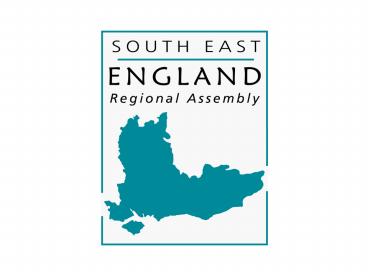Ray Bowers - PowerPoint PPT Presentation
1 / 35
Title:
Ray Bowers
Description:
To reduce dependence on fossil fuels and reduce carbon dioxide emissions ... Demonstration/flagship projects. Raising awareness. Communication between all sectors ... – PowerPoint PPT presentation
Number of Views:55
Avg rating:3.0/5.0
Title: Ray Bowers
1
(No Transcript)
2
Ray Bowers Head of Spatial Planning South East
England Regional Assembly
3
Purpose of the Strategy
- To reduce dependence on fossil fuels and reduce
carbon dioxide emissions - To provide a framework for increasing energy
efficiency and use of renewable energy sources - To review the energy policy of RPG9
- To develop and promote targets for renewable
energy
4
Our Vision
By 2026 there will have been a substantial
increase in the efficiency of energy use the
proportion supplied by renewable sources. By
2026 at least 14 of the regions electricity
generation capacity will be provided from
renewable sources. This will be achieved
through well-designed development that reflects
the tenets of sustainable development
encourages new business and employment.
5
Working Towards our Vision
- Measures to increase efficiency
- Increase use of combined heat and power
- Promote and facilitate renewable energy
6
The Opportunity
- Increase electricity generated from renewable
sources from 0.05 now to 4 by 2010 6 by
2016 14 by 2026 - Enough to power over 1 million homes, and save
1.6 million tonnes of carbon dioxide per year by
2026
7
Implementation
- Planning Policies
- Supply chain and market development
- Raising awareness
- Collective responsibility and action
8
Strategy Process
- Consultation to 9 January 2003
- Revised proposals to government in Spring 2003
- Public Examination
9
David Payne Regional Planner South East England
Regional Assembly
10
Biomass wood, coppice, straw broiler litter
By 2010 potential for 100 MW from 10 large
small CHP plants, increasing to 155 MW by 2026
11
(No Transcript)
12
(No Transcript)
13
(No Transcript)
14
(No Transcript)
15
Offshore windBy 2010 200 MW from up to 4
large wind farmsBy 2026 700 MW from 8 wind
farms
16
Onshore wind Potential for 120 MW by 2010 from
mix of clusters, single large and single small
turbines By 2026, 160 MW from up to 20 clusters,
24 single large turbines and 100 single small
turbines
17
(No Transcript)
18
(No Transcript)
19
South East England Regional Assembly
Solar energy - Photovoltaics By 2010 up to 15 MW
in domestic, commercial other applications.
Increasing to 360 MW by 2026 from over 200,000
installations
20
Regional Renewable Energy Targetskey resources
21
(No Transcript)
22
Policies
- Planning Policies
- Integrating energy and development
- Efficiency CHP
- Renewable Energy
- regional sub regional targets
- areas of wind energy potential
- specific development criteria
23
Policies
- Supporting development of renewables
- Market development supply chains
- Demonstration/flagship projects
- Raising awareness
- Communication between all sectors
- Good practice
24
Implementation
- Energy Efficiency
- Building design orientation
- Influenced by Building Regulations
- Higher standards promoted under various schemes
and advice services - Development plans, briefs and Supplementary
Planning Guidance can influence design
25
Implementation
- Renewable Energy
- Driven by national targets mechanisms, and will
be delivered by - Integration into developments
- Investment by industry
- Support by communities landowners
- Development of supply chains
26
Implementation
- Can be encouraged and facilitate through
- Joint working at local, sub-regional and regional
level - Use of Supplementary Planning Guidance and design
briefs - Identifying barriers and means of overcoming these
27
Strategy for Energy Efficiency and Renewable
Energy
- Conclusions
- To ensure the opportunities are realised, we
need - Positive planning
- Ownership ambition
- Collective responsibility action
28
Breakout SessionsQuestions
- Are the targets ambitious but achievable, and
include the right mix of resources? - Does the Strategy provide sufficient planning
policy guidance on location and design of
renewable energy development?
29
Breakout SessionsQuestions
- What more should the Strategy say about energy
efficiency? - Are there other measures needed to encourage
supply chain and market development and to raise
awareness? - Are further measures needed to implement the
Strategy?
30
(No Transcript)
31
Are the targets ambitious but achievable, and
include the right mix of resources?
- Approp. for 2010, modest for beyond esp re PV
offshore wind - Too much biomass
- More on hydro
- Excl. waste at present need for clear link with
Waste Strategy re. green waste - Target for heat useful
- Look at hydrogen in longer term
32
Sufficient planning policy guidance?
- Who policy aimed at district, sub-regional or
county? - Stronger on site identification vs flexibility of
criteria - Policies to require rather than suggest
- Use of s.106 agreements
- Policy currently too focused on wind large
scale development - More emphasis on community schemes
33
What more should the Strategy say about energy
efficiency?
- Need for targets on efficiency (CO2 emissions)
- Reinforce energy hierarchy in policy
- Energy rating new development
- Use of SPG (energy sustainable development)
crucial - Too much on heating vs cooling
- Require CHP in all new developments
- Opportunities for retrofitting
- Difficult to implement through planning
34
Supply chain, market development and raising
awareness
- Need for commitment ownership by elected
members - Need to lobby to reform NETA
- Need for case studies (incl. policies) of good
and bad - Need to make the case for energy efficiency RE
compelling - Council tax on CO2 emissions
- Expand remit of energy advice centres
35
Other comments issues
- Vision should include climate change
- Need to address skills shortages planners,
building industry - Conflict between community aspirations and large
developers - Local use of locally generated power
- More on heat transport fuels
- Higher targets to reflect need for much greater
cuts in CO2































